Toyota's Operational Problem: Analysis and Improvement Strategies
VerifiedAdded on 2023/04/22
|6
|1323
|324
Report
AI Summary
This report examines Toyota's operational challenges stemming from the accelerator pedal failure crisis, which affected millions of vehicles and significantly damaged the company's reputation. The core issue involved gas pedals becoming difficult to press and slow to return, leading to accidents and raising serious safety concerns. The report details the background of the problem, its impact on customer trust and Toyota's financial standing, and potential improvements through Total Quality Management (TQM) and Sales & Operations Planning (S&OP). By addressing these operational deficiencies and focusing on quality and customer safety, Toyota aims to restore its market position and enhance customer relationships.
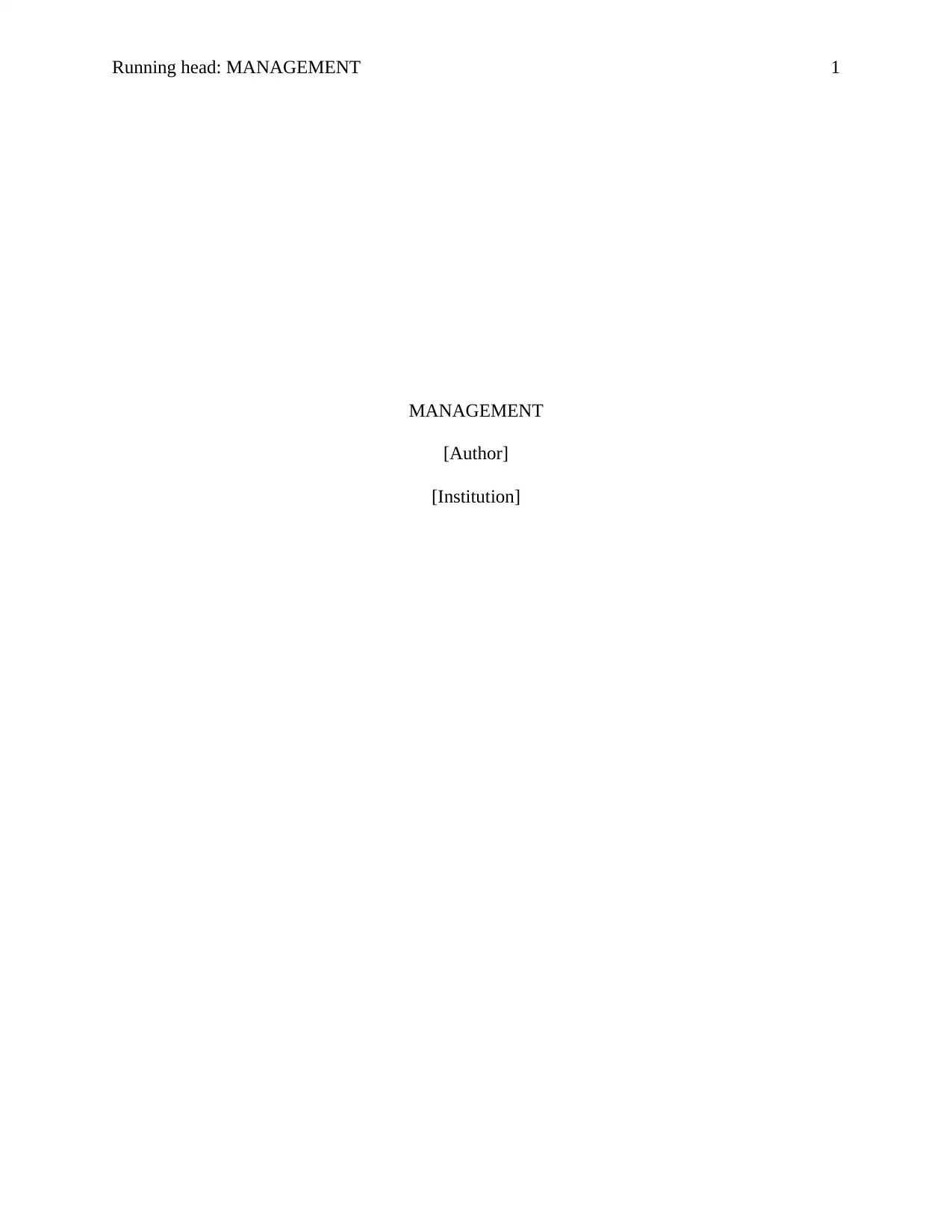
Running head: MANAGEMENT 1
MANAGEMENT
[Author]
[Institution]
MANAGEMENT
[Author]
[Institution]
Paraphrase This Document
Need a fresh take? Get an instant paraphrase of this document with our AI Paraphraser
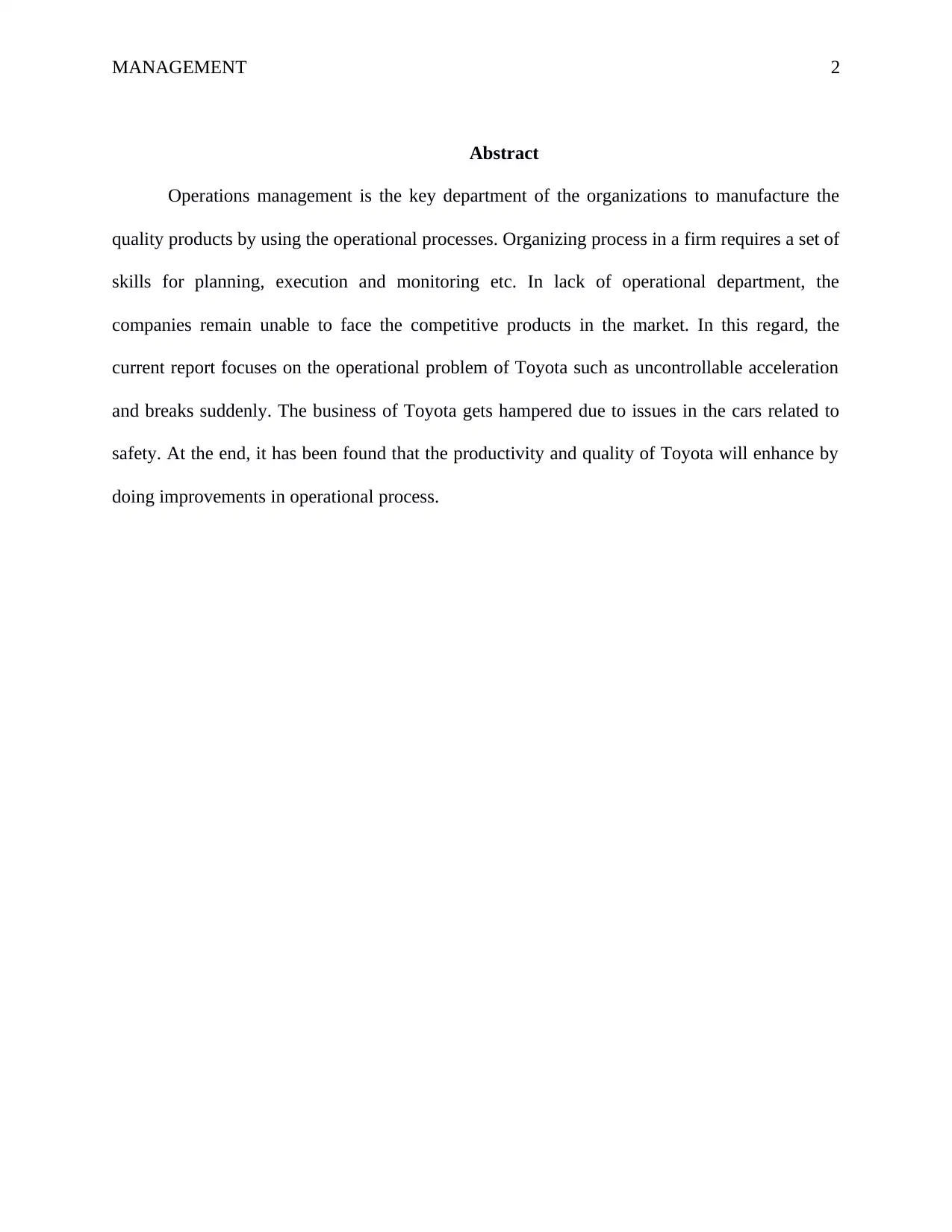
MANAGEMENT 2
Abstract
Operations management is the key department of the organizations to manufacture the
quality products by using the operational processes. Organizing process in a firm requires a set of
skills for planning, execution and monitoring etc. In lack of operational department, the
companies remain unable to face the competitive products in the market. In this regard, the
current report focuses on the operational problem of Toyota such as uncontrollable acceleration
and breaks suddenly. The business of Toyota gets hampered due to issues in the cars related to
safety. At the end, it has been found that the productivity and quality of Toyota will enhance by
doing improvements in operational process.
Abstract
Operations management is the key department of the organizations to manufacture the
quality products by using the operational processes. Organizing process in a firm requires a set of
skills for planning, execution and monitoring etc. In lack of operational department, the
companies remain unable to face the competitive products in the market. In this regard, the
current report focuses on the operational problem of Toyota such as uncontrollable acceleration
and breaks suddenly. The business of Toyota gets hampered due to issues in the cars related to
safety. At the end, it has been found that the productivity and quality of Toyota will enhance by
doing improvements in operational process.
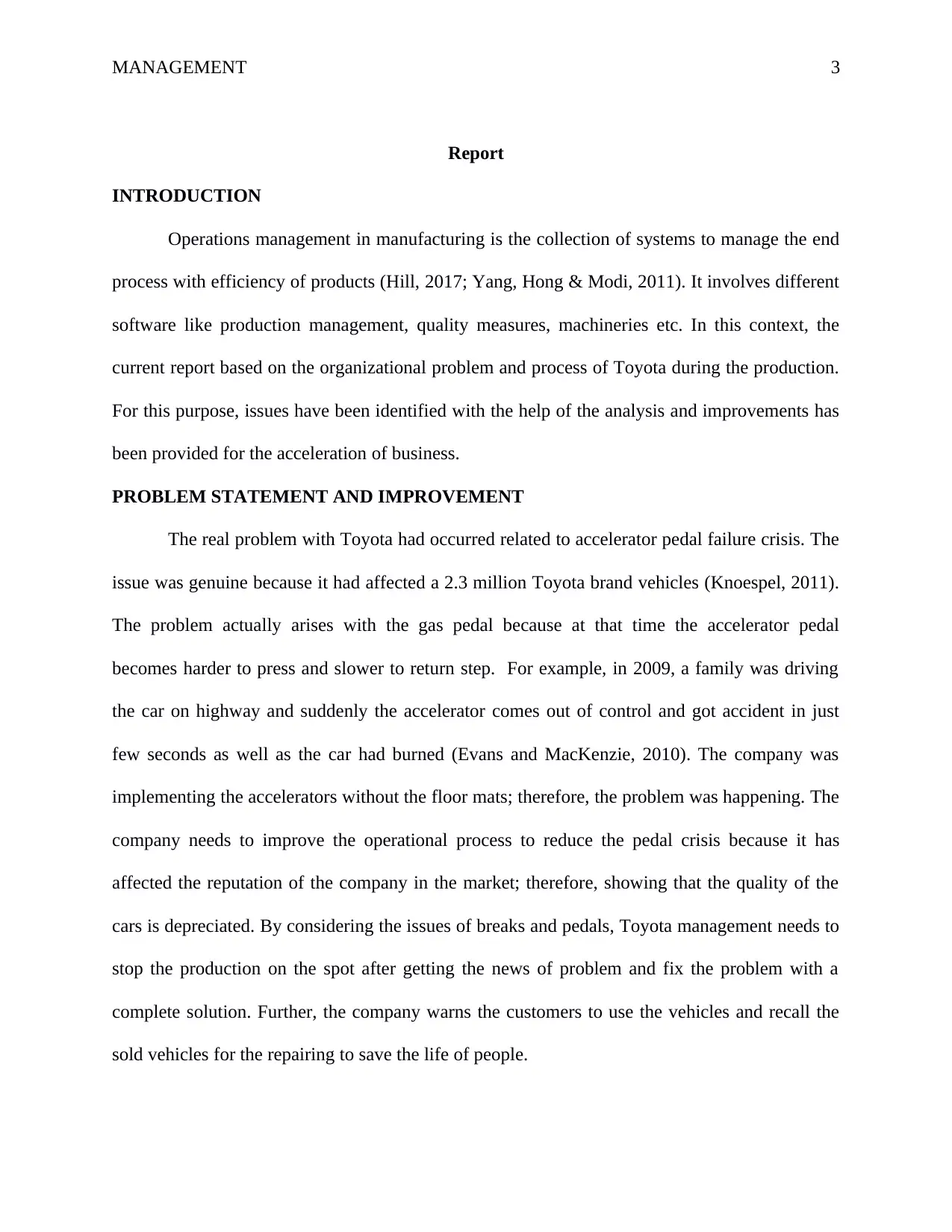
MANAGEMENT 3
Report
INTRODUCTION
Operations management in manufacturing is the collection of systems to manage the end
process with efficiency of products (Hill, 2017; Yang, Hong & Modi, 2011). It involves different
software like production management, quality measures, machineries etc. In this context, the
current report based on the organizational problem and process of Toyota during the production.
For this purpose, issues have been identified with the help of the analysis and improvements has
been provided for the acceleration of business.
PROBLEM STATEMENT AND IMPROVEMENT
The real problem with Toyota had occurred related to accelerator pedal failure crisis. The
issue was genuine because it had affected a 2.3 million Toyota brand vehicles (Knoespel, 2011).
The problem actually arises with the gas pedal because at that time the accelerator pedal
becomes harder to press and slower to return step. For example, in 2009, a family was driving
the car on highway and suddenly the accelerator comes out of control and got accident in just
few seconds as well as the car had burned (Evans and MacKenzie, 2010). The company was
implementing the accelerators without the floor mats; therefore, the problem was happening. The
company needs to improve the operational process to reduce the pedal crisis because it has
affected the reputation of the company in the market; therefore, showing that the quality of the
cars is depreciated. By considering the issues of breaks and pedals, Toyota management needs to
stop the production on the spot after getting the news of problem and fix the problem with a
complete solution. Further, the company warns the customers to use the vehicles and recall the
sold vehicles for the repairing to save the life of people.
Report
INTRODUCTION
Operations management in manufacturing is the collection of systems to manage the end
process with efficiency of products (Hill, 2017; Yang, Hong & Modi, 2011). It involves different
software like production management, quality measures, machineries etc. In this context, the
current report based on the organizational problem and process of Toyota during the production.
For this purpose, issues have been identified with the help of the analysis and improvements has
been provided for the acceleration of business.
PROBLEM STATEMENT AND IMPROVEMENT
The real problem with Toyota had occurred related to accelerator pedal failure crisis. The
issue was genuine because it had affected a 2.3 million Toyota brand vehicles (Knoespel, 2011).
The problem actually arises with the gas pedal because at that time the accelerator pedal
becomes harder to press and slower to return step. For example, in 2009, a family was driving
the car on highway and suddenly the accelerator comes out of control and got accident in just
few seconds as well as the car had burned (Evans and MacKenzie, 2010). The company was
implementing the accelerators without the floor mats; therefore, the problem was happening. The
company needs to improve the operational process to reduce the pedal crisis because it has
affected the reputation of the company in the market; therefore, showing that the quality of the
cars is depreciated. By considering the issues of breaks and pedals, Toyota management needs to
stop the production on the spot after getting the news of problem and fix the problem with a
complete solution. Further, the company warns the customers to use the vehicles and recall the
sold vehicles for the repairing to save the life of people.
⊘ This is a preview!⊘
Do you want full access?
Subscribe today to unlock all pages.

Trusted by 1+ million students worldwide
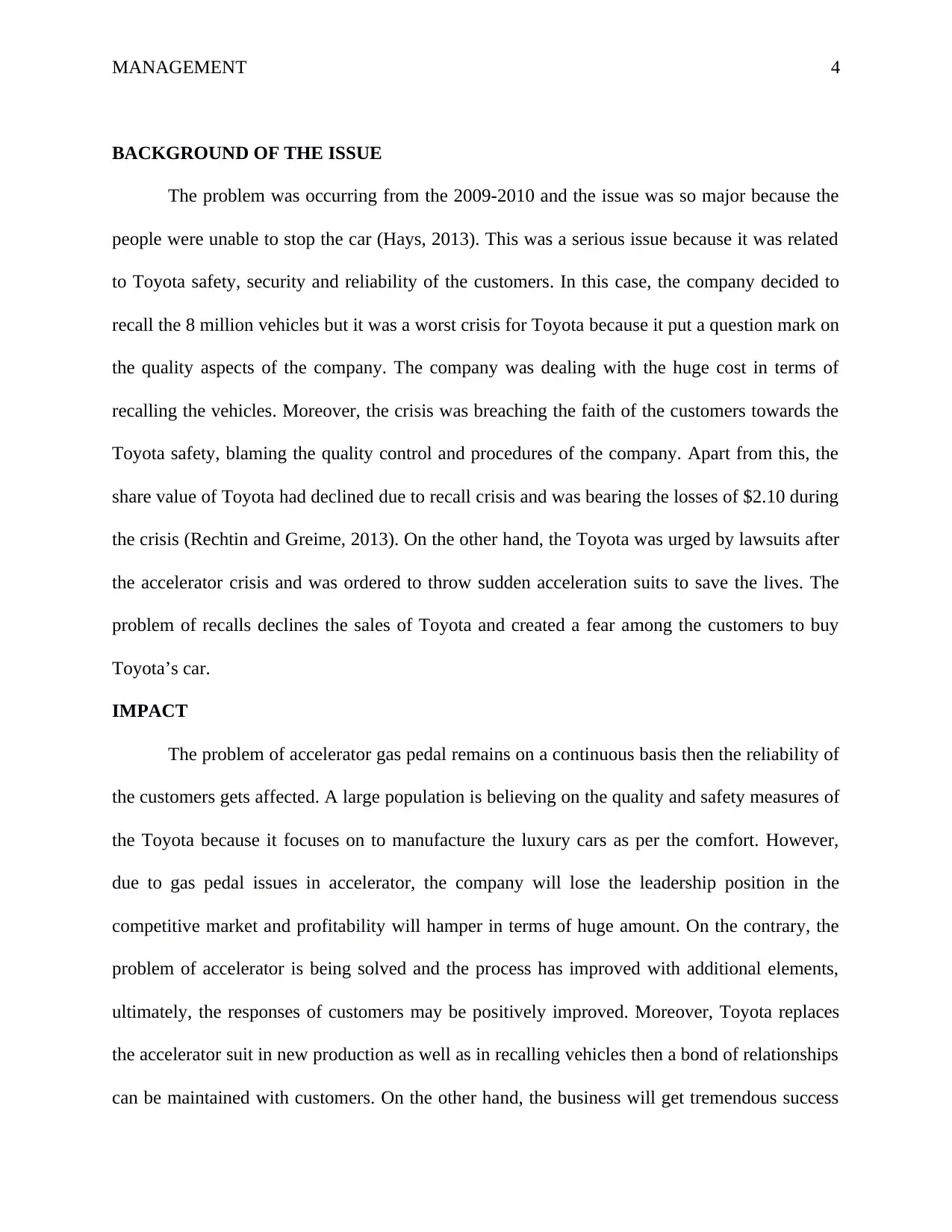
MANAGEMENT 4
BACKGROUND OF THE ISSUE
The problem was occurring from the 2009-2010 and the issue was so major because the
people were unable to stop the car (Hays, 2013). This was a serious issue because it was related
to Toyota safety, security and reliability of the customers. In this case, the company decided to
recall the 8 million vehicles but it was a worst crisis for Toyota because it put a question mark on
the quality aspects of the company. The company was dealing with the huge cost in terms of
recalling the vehicles. Moreover, the crisis was breaching the faith of the customers towards the
Toyota safety, blaming the quality control and procedures of the company. Apart from this, the
share value of Toyota had declined due to recall crisis and was bearing the losses of $2.10 during
the crisis (Rechtin and Greime, 2013). On the other hand, the Toyota was urged by lawsuits after
the accelerator crisis and was ordered to throw sudden acceleration suits to save the lives. The
problem of recalls declines the sales of Toyota and created a fear among the customers to buy
Toyota’s car.
IMPACT
The problem of accelerator gas pedal remains on a continuous basis then the reliability of
the customers gets affected. A large population is believing on the quality and safety measures of
the Toyota because it focuses on to manufacture the luxury cars as per the comfort. However,
due to gas pedal issues in accelerator, the company will lose the leadership position in the
competitive market and profitability will hamper in terms of huge amount. On the contrary, the
problem of accelerator is being solved and the process has improved with additional elements,
ultimately, the responses of customers may be positively improved. Moreover, Toyota replaces
the accelerator suit in new production as well as in recalling vehicles then a bond of relationships
can be maintained with customers. On the other hand, the business will get tremendous success
BACKGROUND OF THE ISSUE
The problem was occurring from the 2009-2010 and the issue was so major because the
people were unable to stop the car (Hays, 2013). This was a serious issue because it was related
to Toyota safety, security and reliability of the customers. In this case, the company decided to
recall the 8 million vehicles but it was a worst crisis for Toyota because it put a question mark on
the quality aspects of the company. The company was dealing with the huge cost in terms of
recalling the vehicles. Moreover, the crisis was breaching the faith of the customers towards the
Toyota safety, blaming the quality control and procedures of the company. Apart from this, the
share value of Toyota had declined due to recall crisis and was bearing the losses of $2.10 during
the crisis (Rechtin and Greime, 2013). On the other hand, the Toyota was urged by lawsuits after
the accelerator crisis and was ordered to throw sudden acceleration suits to save the lives. The
problem of recalls declines the sales of Toyota and created a fear among the customers to buy
Toyota’s car.
IMPACT
The problem of accelerator gas pedal remains on a continuous basis then the reliability of
the customers gets affected. A large population is believing on the quality and safety measures of
the Toyota because it focuses on to manufacture the luxury cars as per the comfort. However,
due to gas pedal issues in accelerator, the company will lose the leadership position in the
competitive market and profitability will hamper in terms of huge amount. On the contrary, the
problem of accelerator is being solved and the process has improved with additional elements,
ultimately, the responses of customers may be positively improved. Moreover, Toyota replaces
the accelerator suit in new production as well as in recalling vehicles then a bond of relationships
can be maintained with customers. On the other hand, the business will get tremendous success
Paraphrase This Document
Need a fresh take? Get an instant paraphrase of this document with our AI Paraphraser
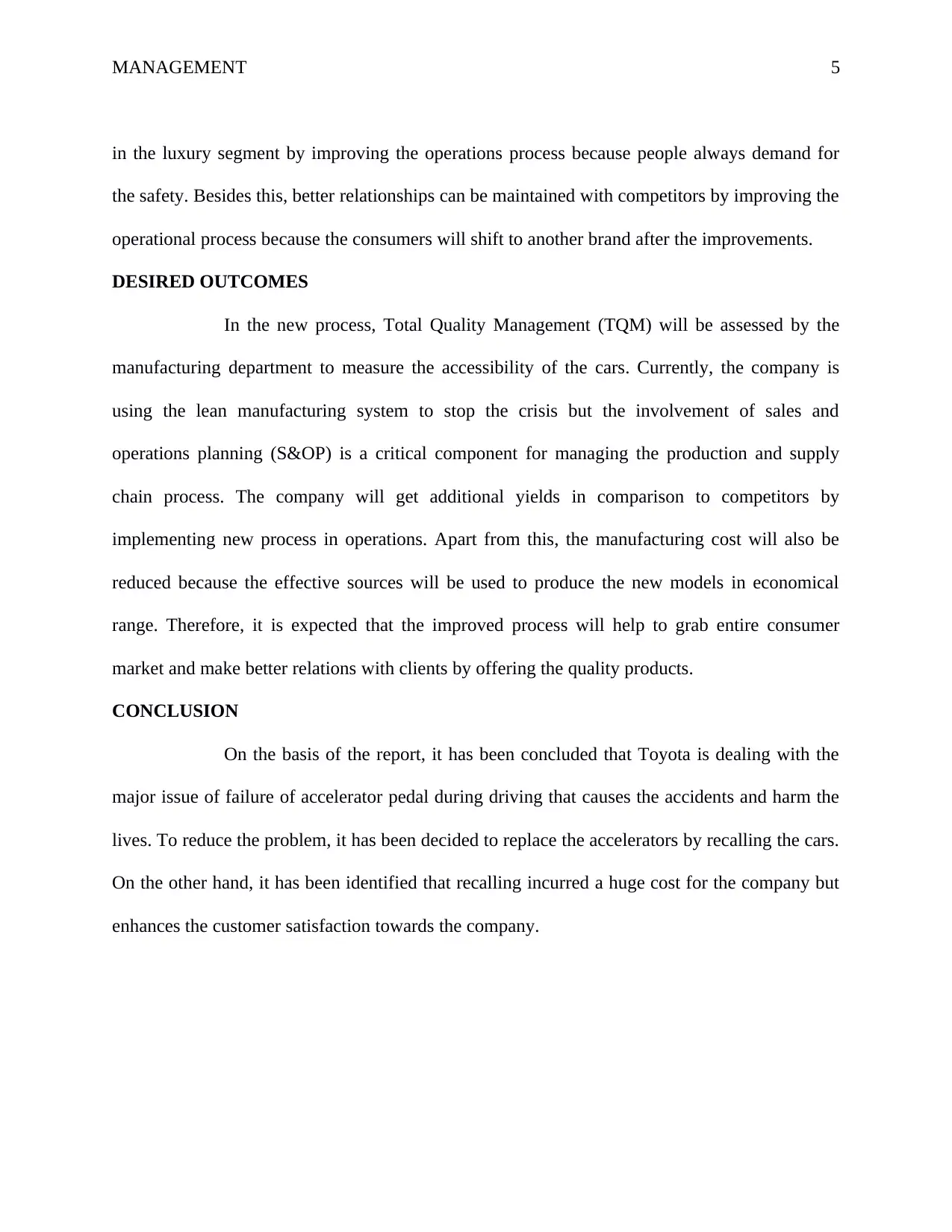
MANAGEMENT 5
in the luxury segment by improving the operations process because people always demand for
the safety. Besides this, better relationships can be maintained with competitors by improving the
operational process because the consumers will shift to another brand after the improvements.
DESIRED OUTCOMES
In the new process, Total Quality Management (TQM) will be assessed by the
manufacturing department to measure the accessibility of the cars. Currently, the company is
using the lean manufacturing system to stop the crisis but the involvement of sales and
operations planning (S&OP) is a critical component for managing the production and supply
chain process. The company will get additional yields in comparison to competitors by
implementing new process in operations. Apart from this, the manufacturing cost will also be
reduced because the effective sources will be used to produce the new models in economical
range. Therefore, it is expected that the improved process will help to grab entire consumer
market and make better relations with clients by offering the quality products.
CONCLUSION
On the basis of the report, it has been concluded that Toyota is dealing with the
major issue of failure of accelerator pedal during driving that causes the accidents and harm the
lives. To reduce the problem, it has been decided to replace the accelerators by recalling the cars.
On the other hand, it has been identified that recalling incurred a huge cost for the company but
enhances the customer satisfaction towards the company.
in the luxury segment by improving the operations process because people always demand for
the safety. Besides this, better relationships can be maintained with competitors by improving the
operational process because the consumers will shift to another brand after the improvements.
DESIRED OUTCOMES
In the new process, Total Quality Management (TQM) will be assessed by the
manufacturing department to measure the accessibility of the cars. Currently, the company is
using the lean manufacturing system to stop the crisis but the involvement of sales and
operations planning (S&OP) is a critical component for managing the production and supply
chain process. The company will get additional yields in comparison to competitors by
implementing new process in operations. Apart from this, the manufacturing cost will also be
reduced because the effective sources will be used to produce the new models in economical
range. Therefore, it is expected that the improved process will help to grab entire consumer
market and make better relations with clients by offering the quality products.
CONCLUSION
On the basis of the report, it has been concluded that Toyota is dealing with the
major issue of failure of accelerator pedal during driving that causes the accidents and harm the
lives. To reduce the problem, it has been decided to replace the accelerators by recalling the cars.
On the other hand, it has been identified that recalling incurred a huge cost for the company but
enhances the customer satisfaction towards the company.
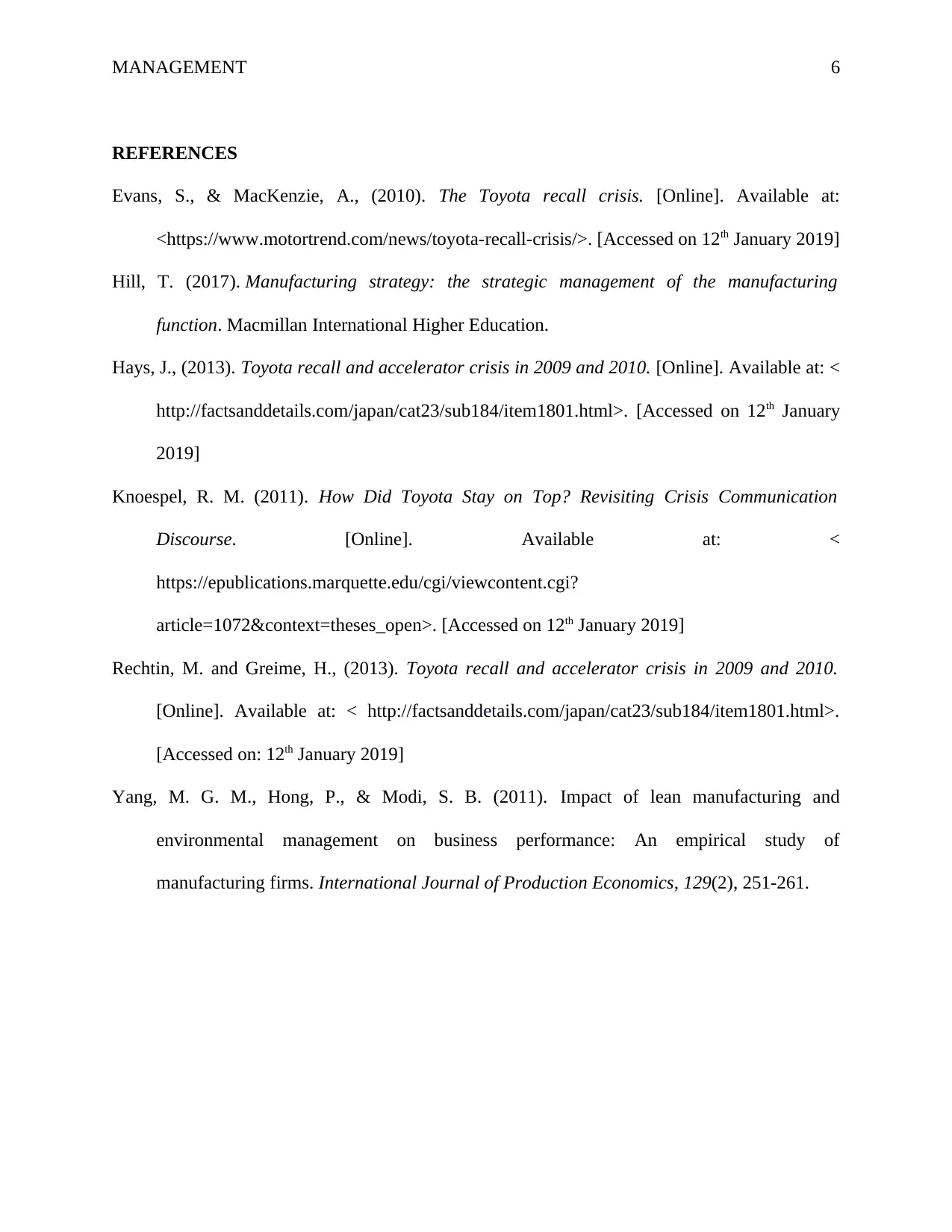
MANAGEMENT 6
REFERENCES
Evans, S., & MacKenzie, A., (2010). The Toyota recall crisis. [Online]. Available at:
<https://www.motortrend.com/news/toyota-recall-crisis/>. [Accessed on 12th January 2019]
Hill, T. (2017). Manufacturing strategy: the strategic management of the manufacturing
function. Macmillan International Higher Education.
Hays, J., (2013). Toyota recall and accelerator crisis in 2009 and 2010. [Online]. Available at: <
http://factsanddetails.com/japan/cat23/sub184/item1801.html>. [Accessed on 12th January
2019]
Knoespel, R. M. (2011). How Did Toyota Stay on Top? Revisiting Crisis Communication
Discourse. [Online]. Available at: <
https://epublications.marquette.edu/cgi/viewcontent.cgi?
article=1072&context=theses_open>. [Accessed on 12th January 2019]
Rechtin, M. and Greime, H., (2013). Toyota recall and accelerator crisis in 2009 and 2010.
[Online]. Available at: < http://factsanddetails.com/japan/cat23/sub184/item1801.html>.
[Accessed on: 12th January 2019]
Yang, M. G. M., Hong, P., & Modi, S. B. (2011). Impact of lean manufacturing and
environmental management on business performance: An empirical study of
manufacturing firms. International Journal of Production Economics, 129(2), 251-261.
REFERENCES
Evans, S., & MacKenzie, A., (2010). The Toyota recall crisis. [Online]. Available at:
<https://www.motortrend.com/news/toyota-recall-crisis/>. [Accessed on 12th January 2019]
Hill, T. (2017). Manufacturing strategy: the strategic management of the manufacturing
function. Macmillan International Higher Education.
Hays, J., (2013). Toyota recall and accelerator crisis in 2009 and 2010. [Online]. Available at: <
http://factsanddetails.com/japan/cat23/sub184/item1801.html>. [Accessed on 12th January
2019]
Knoespel, R. M. (2011). How Did Toyota Stay on Top? Revisiting Crisis Communication
Discourse. [Online]. Available at: <
https://epublications.marquette.edu/cgi/viewcontent.cgi?
article=1072&context=theses_open>. [Accessed on 12th January 2019]
Rechtin, M. and Greime, H., (2013). Toyota recall and accelerator crisis in 2009 and 2010.
[Online]. Available at: < http://factsanddetails.com/japan/cat23/sub184/item1801.html>.
[Accessed on: 12th January 2019]
Yang, M. G. M., Hong, P., & Modi, S. B. (2011). Impact of lean manufacturing and
environmental management on business performance: An empirical study of
manufacturing firms. International Journal of Production Economics, 129(2), 251-261.
⊘ This is a preview!⊘
Do you want full access?
Subscribe today to unlock all pages.

Trusted by 1+ million students worldwide
1 out of 6
Related Documents
Your All-in-One AI-Powered Toolkit for Academic Success.
+13062052269
info@desklib.com
Available 24*7 on WhatsApp / Email
![[object Object]](/_next/static/media/star-bottom.7253800d.svg)
Unlock your academic potential
Copyright © 2020–2026 A2Z Services. All Rights Reserved. Developed and managed by ZUCOL.





